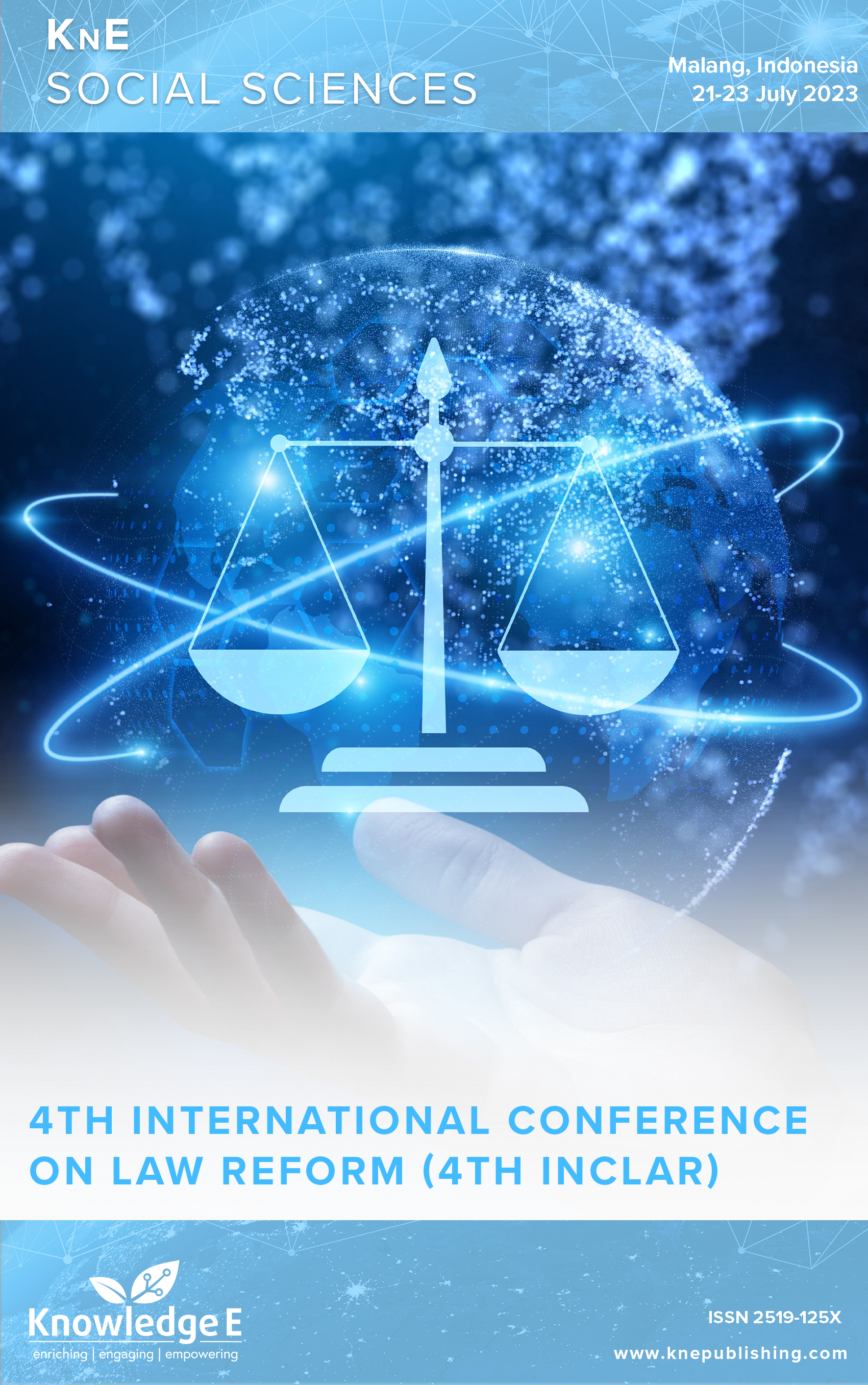Analysis of Meaningful Community Participation in Environmental Sustainability
DOI:
https://doi.org/10.18502/kss.v8i21.14771Abstract
Indonesia has declared that obtaining a good and healthy environment is part of its constitution and human rights. Moreover, the policies governing public participation in creating the environmental policies supporting this assertion, should be considered. This study aims to analyze meaningful community participation in environmental sustainability. The results show that community participation in protecting a good and healthy environment often encounters resistance from business actors whose business activities are suspected to cause environmental pollution or damage. The actions of business actors who report to the police or sue affected communities and environmental rights fighters or activists, carrying out community participation in the form of conveying information, complaints, and objections through media or demonstrations are intended by the plaintiff or the reporting party to remain silent and stop participation.
Keywords: anti-SLAPP, environmental, sustainability, participation
References
Indrawati N. Perlindungan Hukum Terhadap Partisipasi Masyarakat (Anti SLAPP) Dalam Penegakan Hukum Lingkungan Hidup di Indonesia. Media Iuris. 2022;5(1):115. DOI: https://doi.org/10.20473/mi.v5i1.33052
Nyoman Gede Aditya Jay Medhika, Dewi AA, Suryani LP. “Konsep Anti Eco- Slapp dalam Undang-Undang Nomor 32 Tahun 2009 tentang Perlindungan dan Pengelolaan Lingkungan Hidup,”. J. Interpret. Huk. 2022;3(1):220–4. DOI: https://doi.org/10.22225/juinhum.3.1.4752.220-224
Handayani IG, Karjoko L, Jaelani AK, Tegnan H, Hanum WN. “Mechanism for imposing administrative sanctions for communities living in forest areas after the enforcement of the job creation act.”Proc Int Conf Environ Energy Policy (ICEEP 2021). 2021;583(11):229–233. DOI: https://doi.org/10.2991/assehr.k.211014.049
Issues R, Rismawati E, Jaelani AK. The regulation of foreign workers as technology and knowledge transfer. J Sustain Dev Regul Issues. 2023;1(2):64–74. DOI: https://doi.org/10.53955/jsderi.v1i2.8
Tiolince T. Indonesian telemedicine regulation to provide legal protection for patient. J. Sustain Dev Regul Issues. 2023;1(2):75–97. DOI: https://doi.org/10.53955/jsderi.v1i2.9
Dirwan A, Jamin M, Husodo JA. Indigenous community governance policy perspectives on forest area protection. J Sustain Dev Regul Issues. 2023;1(2):122–32. DOI: https://doi.org/10.53955/jsderi.v1i2.12
Friasmita AD, Nisa FH. Securing state’s asset: Legal protection of natural resources of oil and gas. J Sustain Dev Regul Issues. 2023;1(1):18–24. DOI: https://doi.org/10.53955/jsderi.v1i1.3
Luthfia F, Triani T. The authority of oil and gas special task force as a company holder and implementers of upstream oil and gas bussiness activity: A juridical viewpoint. J Sustain Dev Regul Issues. 2023;1(1):31–8. DOI: https://doi.org/10.53955/jsderi.v1i1.5
Mujib MM, Muchlas MK. Achievements and challenges of human rights protection policy in realizing good governance in Indonesia and China. Achievements and challenges of human rights protection policy in realizing good governance in Indonesia and China. 2023;3(2):328–60. DOI: https://doi.org/10.53955/jhcls.v3i2.98
Irawan AB, Riawan DA. Executing upstream oil and natural gas business activities: Legal status and authority of the oil and gas special working unit (SKK). J Sustain Dev Regul Issues. 2023;1(1):9–17. DOI: https://doi.org/10.53955/jsderi.v1i1.2
Firmandayu N, Elfaki KE. The electronic government policy-based green constitution towards good governance. J Sustain Dev Regul Issues. 2023;1(2):108–21. DOI: https://doi.org/10.53955/jsderi.v1i2.11
Fadilla A, Brata Y, Maminiaina R, Sedera H. The implementing a carbon tax as a means of increasing investment value in Indonesia. J Sustain Dev Regul Issues. 2023;1(2):39–50. DOI: https://doi.org/10.53955/jsderi.v1i2.6
Tung S, Cho S. The impact of tax incentives on foreign direct investment in China. J Int Account Audit Tax. 2000;9(2):105–35. DOI: https://doi.org/10.1016/S1061-9518(00)00028-8
Mahrus M, Wijaksana S, Wulandari N. The optimization of environmental policy to achieve sustainable development goals Fatma. J Sustain Dev Regul Issues. 2023;1(2):98–107. DOI: https://doi.org/10.53955/jsderi.v1i2.10
Handayani J, Karjoko L, Jaelani AK, Barkhuizen. “The politics settlement of land tenure conflicts during Jokowi’s Presidency,”. J. Indones. Leg. Stud. 2022;7(2):487– 524. DOI: https://doi.org/10.15294/jils.v7i2.57539
Jamin M, Jaelani AK, Mulyanto RO, Kusumaningtyas RO, Ly DQ. Kusumaningtyas, and D. Q. Ly, “The Impact of Indonesia’s Mining Industry Regulation on the Protection of Indigenous Peoples”. Hasanuddin Law Rev. 2023;9(1):88–105. DOI: https://doi.org/10.20956/halrev.v9i1.4033
Kusumaningtyas RO, Subekti R, Jaelani AK, Orsantinutsakul A, Mishra UK. Reduction of Digitalization Policy in Indonesian MSMEs and Implications for Sharia Economic Development. Juris J. Ilm. Syariah. 2022;21(2):157–71. DOI: https://doi.org/10.31958/juris.v21i2.6855
Parikesit W, Shah MQ. The Rise of Centralistic Governance in Spatial Planning in Indonesia and Australia: A Comparative Study. Bestuur. 2023;11(1):121–43. DOI: https://doi.org/10.20961/bestuur.v11i1.70120
Setiabudhi DO, Yunus A, Rifky A. The Role of Land Management Paradigm Towards Certainty and Justice. Bestuur. 2023;11(1):43–60. DOI: https://doi.org/10.20961/bestuur.v11i1.71710
Saputra R, Tiolince T, Iswantoro I, Sigh SK. “Artificial Intelligence and Intellectual Property Protection in Indonesia and Japan,”J. Hum. Rights. Cult. Leg. Syst. 2023;3(2):210–35. DOI: https://doi.org/10.53955/jhcls.v3i2.69
Ulfatun F, Abrar D. “The Shaping of Future Sustainable Energy Policy in Management Areas of Indonesia ’ s Energy Transition,”J. Hum. Rights. Cult. Leg. Syst. 2023;3(2):361–82. DOI: https://doi.org/10.53955/jhcls.v3i2.110
Swardhana GM, Monteiro S. Legal Policy of State Financial Losses Arrangement in a State-Owned Enterprise. Bestuur. 2023;11(1):171–90. DOI: https://doi.org/10.20961/bestuur.v11i1.61326
Zaid M, Musa M, Arjuna F, Cait L. “The Sanctions on Environmental Performances : An Assessment of Indonesia and Brazilia Practice,”J. Hum. Rights. Cult. Leg. Syst. 2023;3(2):236–64. DOI: https://doi.org/10.53955/jhcls.v3i2.70
Gunawan Y, Hazyar M. “The Climate Change Litigation Based Human Rights Approach in Corporations : Prospects and Challenges.”J. Hum. Rights. Cult. Leg. Syst. 2023;3(2):288–307. DOI: https://doi.org/10.53955/jhcls.v3i2.116

